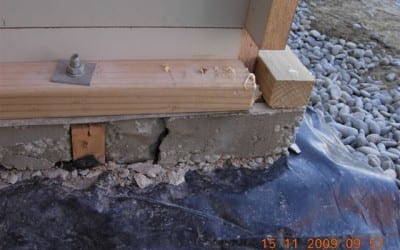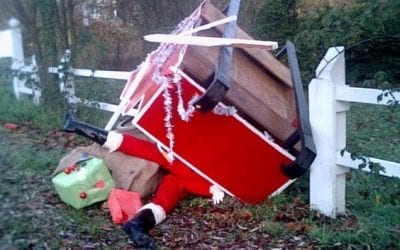A significant proportion of disputed insurance claims involve gradual damage, and there has been a spate of recent claims involving timber left exposed to the elements for long periods of time. It is important to understand why claims like this are declined and how the interpretation of gradual damage may affect your public liability and contract works insurance cover.
Sudden, unexpected and unintended
Most insurance policies are designed to cover sudden, unexpected and unintended losses, and most claims automatically fall within this definition: e.g. fire, theft, flood, storm, accidental breakage, etc. However, some losses are not caused by these types of events and insurance is generally not designed to cover them. This is because they are not sudden, but are often avoidable by taking normal, reasonable measures to limit the chance of damage or loss. To emphasise this, many policies now specifically exclude gradually occurring damage. For example, your public/general/broadform liability policy may include an exclusion similar to this:
You are not insured for loss, legal liability, prosecution or expense of any type in connection with a building or structure being affected by: moisture or water build-up or the penetration of external moisture or water, or the action or effects of mould, fungi, mildew, rot, decay, gradual deterioration, micro-organisms, bacteria, protozoa, or any similar or like forms.*
And a contract works policy may exclude gradual damage in this way:
This policy does not insure any of the following types of damage to insured property: slowly developing deformation or distortion, gradual deterioration, rot or mildew, loss caused by corrosion, action of light, or inherent nature of the property, wear and tear, exposure to weather conditions if the insured property is not designed to be left in the open (unless reasonable precautions have been taken to protect the property from these conditions), normal settlement, shrinkage or expansion of buildings, foundations or walls.*
*These are examples only, and you should refer to the precise wording of your own insurance policy
Sudden v gradual damage
While every insurer will have their own definition, here’ a simple dictionary definition of each:
Sudden: “Occurring or done quickly”
Gradual: “Taking place slowly or by degrees”
Applied to an insurance claim, damage is considered to be gradual if it has occurred slowly. Some may even argue that “quickly” and “slowly” are relative terms. For example, is the damage that occurs over the course of a week sudden or gradual? Unfortunately, there is no set answer to the question “how long does it have to be before it’s considered gradual?”, as each event has to be considered according to the specific circumstances at the time.
Sudden discovery
Sometimes,s claimants argue that a claim should be accepted because they discovered the damage suddenly, for example, when rotten floorboards gave way. However, it is not the sudden discovery of damage which dictates whether a claim is valid, but whether the nature of the damage was sudden or gradual.
Sudden cause
Another argument can arise if the initial cause of the damage was a sudden event, such as a storm damaging the roof, which causes a leak, or a burst pipe that does the same. However, it is not the suddenness of the cause that is relevant, but the time it takes for the damage to occur. So the storm damage to the roof may be covered because it happened suddenly, but the gradual damage to the timber framing that results from the subsequent leak may not be.
Resultant damage
In the above example, sudden damage (storm damaging the roof) has resulted in further gradual damage (rotten timber framing). The storm damage would typically be covered, but the gradual damage to the framing would not. In some cases, it can happen the other way around: gradual deterioration, say a pipe fitting corroding, may result in sudden damage when the pipe bursts and floods the house. In this case, the corroded pipe would not be covered, but the resulting damage from the flood would be.
What does this mean for you?
Sudden, unexpected and unintended events are generally covered by your insurance, but damage that happens gradually over time is not. You need to take reasonable precautions to minimise the chance of damage happening at the sites you’re working at.



